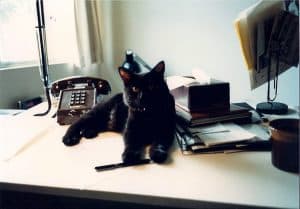
Tuesday, 9:20pm
Reno, NV
“Yep, nothin’ gets by me, cuz I’m a real fart smeller… uh, I mean smart feller.” (Cousin Donald)
Howdy…
It took me an awful long time to figure out that — to get anywhere in life — I would have to buckle down and actually get good at something.
That was a painful realization. I was thirty-two at the time, no longer young, no longer having fun doing the things that had pleased me so thoroughly just a year or so earlier.
I was done with having potential.
Screw potential.
Potential can murder your life.
All through my formative years, I was given special attention because I could draw well (I had weekly cartoon stips in both my high school and college newspapers) (even won a Quill & Scroll award)… had some musical ability (my ragged bands played for friends’ parties and at school dances)… and evidenced a little precociousness with my fiction writing.
Relax. I sucked at fiction. I wrote complete stories, was all. On my own time. This amazed teachers, but it wasn’t anything all that great. Any early signs of authorship had absolutely no correlation to copywriting. In fact, it probably set me back a couple of years.
As I’ve often said, it’s easier to teach a near-illiterate salesman to write good copy, than it is to teach salesmanship to someone with a Ph.D in English literature.
But back then, I was just good enough at several creative skills to suffer the curse of potential.
You know what potential does? It gets you credit for not actually doing anything difficult. You get used to the easy accolades… and never develop good work habits, cuz it’s no big deal for you.
During my days hanging with the “D” list Hollywood crowd, I saw the ravages of potential up close and personal. Most of the folks who’d ever been praised for a small acting gig, or had a bad TV screenplay optioned, or had scored a “meeting with John Candy’s people”… coasted on that cloud for as long as possible.
For many, their brush with success became a standing joke. We’d make bets on how long they’d wait before bringing it up to someone new. (Average time: About three minutes.)
If I was in charge of the world, I’d take every kid with potential aside… and clap them all into a boot camp, where we’d wipe that smirk off their face. And make ’em earn some real kudos.
It’s the only way to save most of them.
The most vivid example of potential versus reality I ever saw was down in Miami Beach, after it’d become a hotbed of the fashion world. Every day, several buses would arrive, crammed with young women who were the best-looking creatures who’d ever graced the small town they’d just come from.
And it took about an hour for them to realize that, as god-like as they were treated back home, here in the center of the model universe, they weren’t even on the map.
It isn’t fair.
But it’s the way it is.
So the person with a little “natural” talent at something may have a tiny advantage over the raw rookie who never heard the term “potential” tossed their way.
But that tiny advantage is irrelevant… unless it gets honed into a big advantage.
And guess what? It takes just about the same amount of hard work to hone a little talent, as it does to go from zero to hero.
Never let your perceived lack of natural ability stop you from trying something.
I’m thinking about this, after seeing Bela Fleck, Stanley Clarke and Jean Luc Ponte at the Hawkins outdoor amphitheater tonight. Stunning expertise there — on violin, gut bass, and jazz banjo.
They were dressed casually, they didn’t require any formal introductions, they joked and were at ease with each other and the crowd while they played.
And it was exquisite.
These guys are experts. And if you listen closely, you can catch pieces of Bach, Mahavishnu Orchestra, Coltrane and Weather Report licks thrown in, as teasing references.
Nice stuff. I’ve been following these musicians, separately, for thirty years. They were damn good back then. They are transcendental now.
Earlier today, I hung out in the kitchen while a new repairman took apart the built-in microwave, found hidden ice blocking the fan in the freezer, and showed me the right Allen wrench to use on the locked-up garbage disposal.
I thoroughly enjoyed watching him work. In another life, I could have happily been an odd-jobs artist… going deep into the mechanical flotsam of our lives.
He had a complaint — he’d hired, and fired, almost twenty different guys in the past year, trying to find someone who could handle some of the repair work for his thriving business.
The problem was best illustrated by the last guy — who wasted forty-five minutes trying to remove a plastic cover inside a broken dishwasher door… and finally brought the entire door back to the shop. He insisted it was permanently welded shut. The boss took it apart in twenty seconds.
“The thing is,” he told me, “that guy should have been humiliated. But he wasn’t. These rookie repairmen all want me to teach them the specifics of doing each job… but it ain’t like that.”
“It’s the process they need to learn,” I said.
“That’s right. Not the details of just that one job. They need to fall in love with figuring this stuff out.”
“It’s the same with advertising,” I said. “Great ads are the result of great sales detective work. And few want to put in the sweat.”
“Damn straight,” he said. And refused payment for fixing the fridge. Said it was his pleasure, because he enjoyed talking to me as he worked.
So… I’ve been thinking about expertise. What it is, what it takes to attain it. And what it means, after you have it.
And while I’m thinking… I get an email from someone that says: “Hey John. I want to be a world-class copywriter. What do I do to get started?”
Ummmmmm….
And it dawns on me. Finally.
There’s a great quote I like: Learn your craft first. It won’t stop you from being a genius later.
The musicians tonight displayed genius, yes… but they expressed it through a master craftman’s skill level.
The repairman seemed to be working magic, listening to the freezer and finding the exact problem as if by divining the source. But really, he was just using the skills of his craft — figuring things out.
I’ve argued before that Picasso ruined painting. Not on purpose, of course. He went off on a totally bitchin’ tangent that riveted the world.
But everyone who learned painting after that, started with Picasso’s abstracts. They completely ignored the fact he was an accomplished realist, first. Knew his craft.
He broke the rules, only after showing he was a master of those rules.
The minions who followed, showed little consciousness of any rules at all. They want credit for being creative… “like Picasso.”
They want you to gaze at their crap, and fathom the potential there.
Because, you know, it’s abstract.
But they lack real craftmanship.
Pisses me off.
You can get away with it, of course, in “art”.
But not in marketing.
All the top guys are super-skilled craftsmen at their job. They learned to write well, and they learned the essentials of great marketing… sometimes painfully, taking however long it required.
Draft after draft after draft. Job by job. Client by client.
There are shortcuts to the gig… but you still have to patiently learn the craft first. This is the thing so many rookies can’t quite get a handle on. You don’t just become world-class because you really, really, really want it.
Be a craftsman. There’s some transcendental joy in knowing you’ve mastered something beyond the smirk of potential.
Stay frosty,
John Carlton

Sunday, 9:07pm
Reno, NV
“When choosing between two evils, I always like to try the one I’ve never tried before.” (Mae West)
Howdy…
A friend, who is briliant at marketing, asked me a question today about writing that has implications for most people.
This guy is a decent writer… but it takes him forever to get copy down on paper. It’s just agonizingly slow, and he hates me because I do it so fast.
Everytime we talk, he sneaks in a question about my writing “habits”, hoping to find the hidden magic secret to getting copy knocked out in record time. This time, he asked about my notoriety as a night owl, and whether I wrote best late at night.
I am a night owl. Even as a kid, the late evening hours held special allure for me. I suffered in the “real” corporate world, because arriving to work by 8 am was just an ordeal. I nearly flunked several courses in high school and college, because they began at 9 am.
Night owls get no slack from anyone.
There have been numerous studies proving that “night people” do exist — our body temperature, alertness and problem-solving abilities actually increase after dinner. A few savvy schools have even identified kids who were like me, and by moving thier classes to the afternoon, reversed their academic decline.
When I first went out on my own as a freelancer, one the of HUGE benefits was being able to work all night, and not worry about having to show up at anyone’s office looking bright and spiffy the following morning. I would frequently work until dawn.
The guy asking me about working at night is also an admitted night owl. He’s also a married man with kids, and a nocturnal work habit wouldn’t go over so well with the family.
So I told him to forget about trying to find the magic of writing fast and good by staying up later.
Because, early in my career, I made a discovery that I didn’t want to be true: I could write juust as good, and just as fast, just as easily, in the morning… as I could in my so-called “peak” hours late at night.
This discovery ruined my best excuse for not writing during the day. Turns out, once you become a craftsman at a skill, you can crank it up whenever it’s needed.
You may pay a price — such as getting exhausted faster, or screwing up your sleeping habits… but you CAN do it. You are NOT a slave to preconceived working hours.
However… I do recommend that you find a time in your day, every day, where you can arrange the space, peace and equipment to write. A two-to-four hour slot of uninteruptable time.
It can be first thing in the morning (as many famous writers insist on), or at the end of the day, after everyone else has turned in (as many other writers end up doing). Get the social implications of your choice in order, so that time becomes sacred. Phone off the hook, locked door, drapes pulled, whatever it takes.
It’s using the power of ROUTINE. There are two reasons why routine works for writers:
1. It becomes an addiction. At whatever-o’clock, you will quickly feel like you need to be at your desk, writing. Anything else that comes up, short of the house burning down or a visit to the ER, gets second billing. You’ll be back to the “real” world right after your writing session. But for now, you’ve got an appointment with a blank page.
2. You actually train your body to dump the internal stew of hormones and chemicals that aid in the kind of focused concentration and mind-play required to write.
It’s the same reason you should exercise at the same time every day — your body will actually do a little preparation as you head to the gym, gearing up the broth needed for lifting and sweating and grunting.
Sleep experts say the best way to get more deep sleep, while sleeping less total hours, and feeling more energy while awake… is to simply have the same bedtime and rising time, every day of your life. So your body isn’t freaked out — like a dog anxiously wondering if we’re ever gonna go to bed tonight — by changing patterns, and so doesn’t overdose or underdose on REM and dreams.
Same with diet. Bill Phillips, author of “Eating For Life” and a guy you do NOT want to argue with about diet, eats six meals a day, at regular times. So his body doesn’t gobble up each opportunity to store fat, thinking he’s starving. And it learns to function at optimum capacity on smaller portions.
So… the key to pumping out reams of great writing, is to set up routines. For some reason, the last few generations (startng with mine) have scoffed at routine, like it’s some cute relic of our grandfather’s time.
It’s not. You can spend the rest of your day being unpredictable and spontaneous and wonderfully whacky… but when it comes to your designated writing time, no one and no thing interferes.
This is a primary element of Operation MoneySuck: Do what you need to do to get the important stuff done, efficiently and regularly.
Side note: You won’t find your groove immediately. You may have to try finding your solid two-to-four hours at different times in your day, through trial and error.
The key is to find a time where you won’t be interupted. My assistant, for example, sometimes arrives while I’m still in writing mode. She knows not to disturb me, doesn’t take it personally, and even takes steps to make sure nothing else disturbs me either.
People will cooperate, once they understand what you’re trying to do.
Sort of. There will also be people in your life who cannot abide the idea that someone (like you) might actually be doing something proactive with your life. And they will find ways to screw with your routine.
It will become important for them to find a way to make you NOT establish a routine. Trust me on this. Mostly, they’re doing this unconsciously… but sometimes they’re well aware of what they’re doing.
When you start establishing radical routines like this, you’ll start producing stuff at an alarming rate. Your life will begin to move faster, and things will begin happening to you. Goals will start getting met, money will start pouring in, your status and position will grow.
This frightens those people in your life who fear change. Watch for this trap. Don’t fall for it.
Side note #2: It will take a while for you to realize when you’ve found your groove, too. People tend to forget that it takes time to get over being the new kid on the block… no matter what you apply that metaphor to.
The first few times I went to my new gym, I felt like the New Guy. Because I WAS the new guy. There was some awkwardness, everyone was a stranger, I got lost trying to find the men’s room.
Then, one fine day a few weeks later, I realized I was totally comfortable at this place. I had a routine. I waltzed in, and said hello to the attendant, who had my towel and bottle of water already waiting for me. All the regular staff nodded hello to me as I passed them. I breezily established my position at my usual warm-up bike, nodded at the other regulars (all on their favorite machine), and drifted easily into “I’m exercising here” mode.
Don’t sweat being the New Guy. It’s just a transition period you must go through. It’s the way it works.
Same with your writing routine. It won’t feel exactly right at first. May take you months to get settled in the right time, with the right routine. So what?
Once you do find your groove, you are off to the races.
Go get ’em…
Stay frosty,
John Carlton




